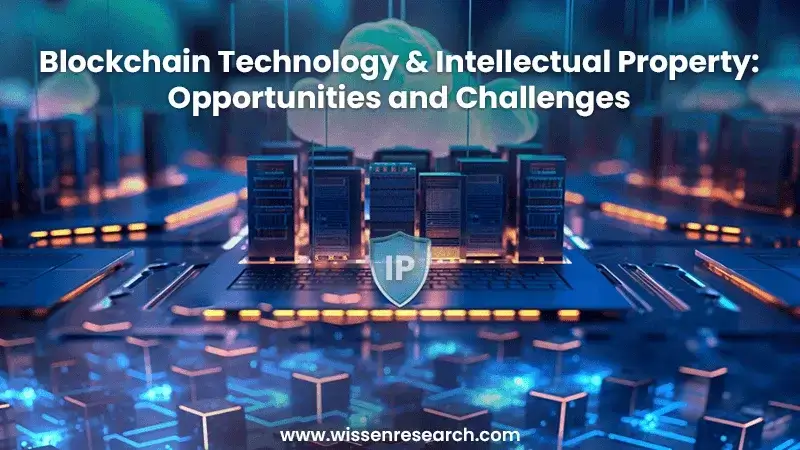
As blockchain works its magic across industries, the intellectual property realm also feels its transformative powers!
Protecting trademarks, copyrights, and patents is vital for every major industry, and blockchain technology assists in creating an ecosystem to provide legal protection. As the decentralized ledger technology safeguards patents and inventions, inventors & companies can invest their valuable time in research and development. Like any domain, integrating blockchain technology in the intellectual property domain has unique challenges that can’t be overstated.
In this post, we delve deep into the world of blockchain technology and intellectual property law. The post will discuss the opportunities and challenges this unique intersection will bring to the intellectual property domain.
Let’s begin with the basics first, before delving into the intricacies.
Blockchain technology is an advanced and decentralized database storage mechanism. The technology stores data in small chains linked together in chronological order and stored on different decentralized databases. No one, not even the admin, can edit or modify the information stored without consensus from the network.
You can also read: Everything You Need To Know About Blockchain Technology
Trademark to NFTs: Inventors and businesses can leverage blockchain technology to transform their trademarks/patents into digital assets (NFTs). Each NFT has its own unique identification number recorded on the blockchain, making it easy to track unauthorized usage, secure storage, and improve overall asset protection.
Smart contracts: Blockchain-powered smart contracts could replace traditional licensing and contract agreements in the intellectual property domain. The self-executing and monitoring capabilities of smart contracts make them ideal for collecting royalty payments. Every time the owner’s copyrights are used, a fixed royalty contribution is added to their account, thus streamlining the entire process.
IP Portfolio Management: Integrating blockchain technology assists inventors and organizations in effectively monitoring their IP portfolio. Any infringement or unauthorized use of a trademark or patent will be highlighted in real-time, simplifying and securing the enforcement process. Further, the technology can be leveraged to work out licenses with third parties.
Decentralized IP Marketplace:
Another big opportunity with the integration of blockchain technology is the development of decentralized IP marketplaces. Investors and companies can tokenize their trademarks or other IP rights and list them on different IP marketplaces similar to NFTs. With this, they can streamline the leasing or selling of intellectual property rights, thus empowering them to generate an alternate revenue generation source.
Decentralized IP Database: Blockchain technology has the potential to revolutionize the way intellectual property rights are stored, managed, and enforced. The decentralized database is easily accessible and ensures that the information stored can’t be modified or deleted without consensus. Anyone can access information related to the patent, such as creation date, ownership, and other relevant details. Further, the decentralized system plays a major role in simplifying dispute resolution and safeguarding patents against issues like counterfeiting and unauthorized use.
Lack of Interoperability: To date, over 1000 blockchain are in circulation and use different standards and protocols. Lack of interoperability within different blockchain networks hinders communication and data-sharing capabilities.
Complex Implementation Process: Integrating blockchain technology within existing IP databases is a complex process that requires specific resources and technical expertise. These implementation challenges could become a barrier for organizations looking to adopt blockchain solutions.
Enforcement Challenges: While the security and restriction of unauthorized access to IP rights under the blockchain will never be a question, enforcing rights in the real world could be challenging.
Legal Uncertainties: The lack of legal & regulatory framework surrounding blockchain technology puts it in the back seat. Although WIPO has established a Blockchain Task Force under the Committee on WIPO Standards, but the uncertainties regarding jurisdiction, liability, and compliance can be challenging for blockchain adoption.
Resistance from traditional stakeholders: The integration of blockchain in intellectual property law might face resistance from stakeholders who are familiar with conventional systems and approaches.
Conclusion
From managing to licensing and enforcement of IP rights and trademarks, the decentralized technology will reshape the intellectual property domain. Blockchain technology and intellectual property intersection will open up new opportunities like smart contract implementation, IP portfolio management, decentralized IP database, and marketplace.
However, blockchain technology has to overcome a lot of challenges, becoming a widespread reality for the intellectual property sector.
Authored By :- Harshdeep